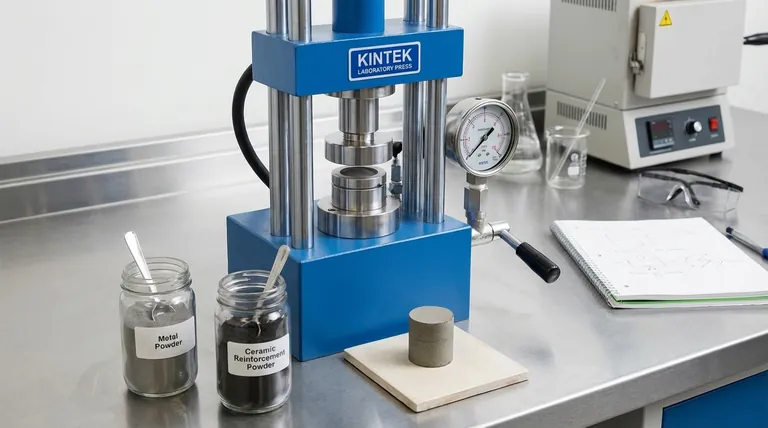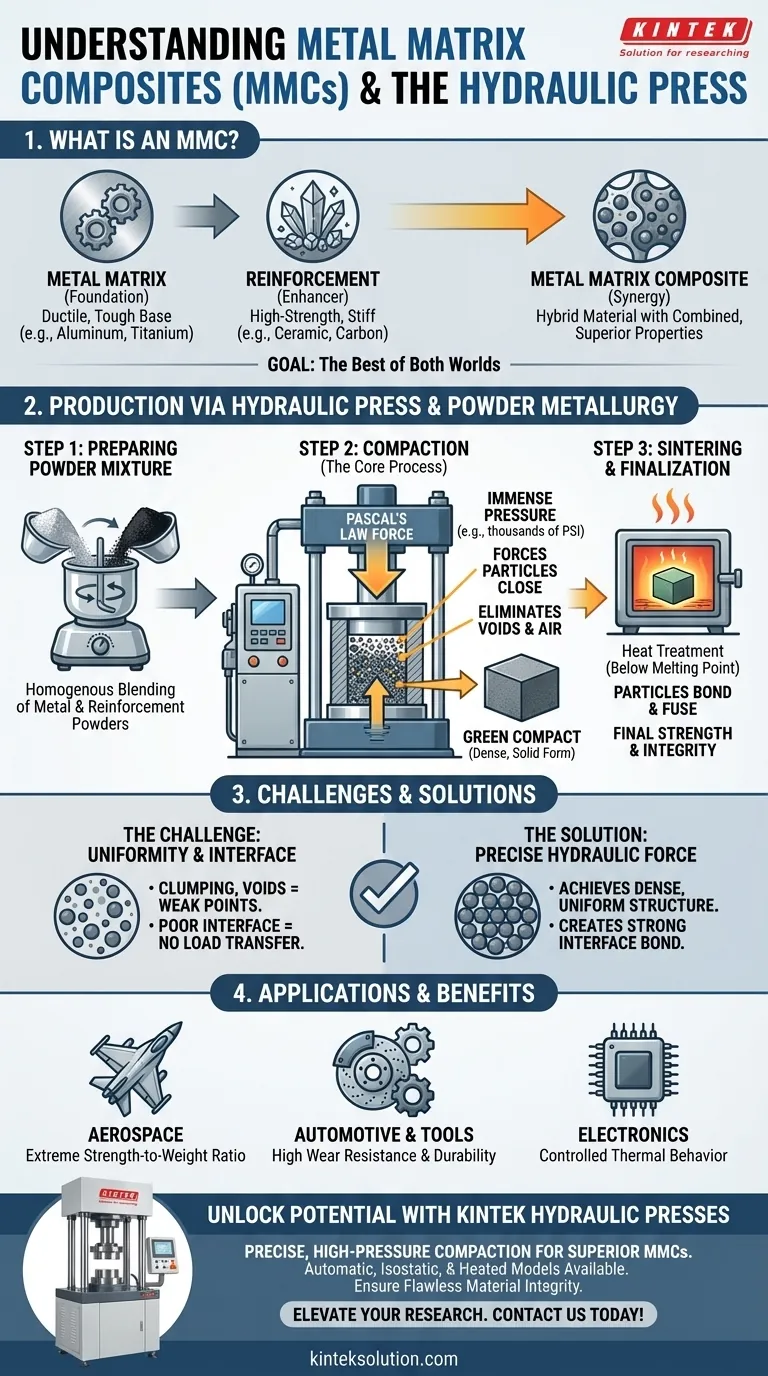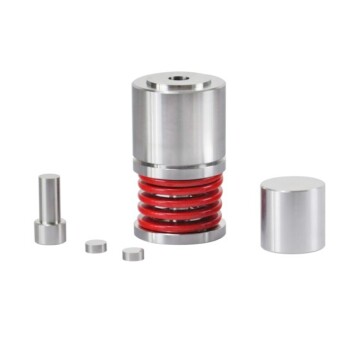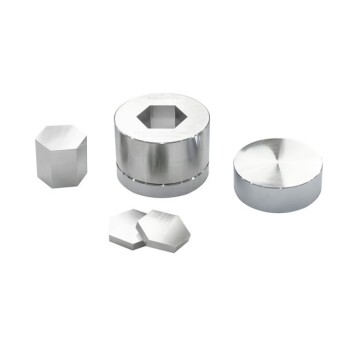In advanced materials engineering, a Metal Matrix Composite (MMC) is a hybrid material created by combining a ductile metal with a high-strength reinforcement, such as a ceramic or organic compound. The hydraulic press is a critical tool used in the powder metallurgy fabrication route, where it applies immense, controlled pressure to a mixture of metal and reinforcement powders in a mold. This compaction process forces the particles into close contact, creating a dense, solid form known as a "green compact" before it is finalized with heat treatment.
The core challenge in creating a high-performance MMC is not just mixing materials, but achieving a flawless, uniform internal structure. A hydraulic press is the essential instrument that uses immense, evenly distributed force to eliminate voids and create this dense foundation, which is then metallurgically bonded through heat.

Deconstructing Metal Matrix Composites
Metal Matrix Composites are designed to achieve a combination of properties impossible to find in a single monolithic material. The final product leverages the distinct advantages of its constituent parts.
The Metal Matrix: The Foundation
The matrix is the base metal that encloses and binds the reinforcement. Common matrix metals include aluminum, magnesium, and titanium.
This metal provides the material's overall ductility, toughness, and form, acting as the foundation that holds the entire structure together.
The Reinforcement: The Performance Enhancer
The reinforcement is the substance added to the metal to enhance specific properties. This can be a ceramic (like silicon carbide), carbon (like graphite or carbon fiber), or another high-performance material.
Reinforcements are chosen to add specific characteristics like exceptional stiffness, high-temperature strength, wear resistance, or low thermal expansion.
The Goal: The Best of Both Worlds
The objective of an MMC is to create a synergy between its components. For example, by embedding hard ceramic particles into a lightweight aluminum matrix, you can create a material that is both light and highly resistant to wear—ideal for automotive brake rotors or engine components.
The Role of the Hydraulic Press in Powder Metallurgy
Powder metallurgy is a primary method for producing MMCs. The hydraulic press is the engine of the most critical step in this process: compaction.
Step 1: Preparing the Powder Mixture
The process begins by carefully blending the fine metal powder with the powdered reinforcement material. Achieving a perfectly homogenous mixture is crucial for the final component's integrity and uniform performance.
Step 2: Compaction via Hydraulic Force
The powder mixture is loaded into a precision-machined die (a mold). The hydraulic press then applies force using Pascal's Law, where pressure applied to a confined fluid (hydraulic oil) is transmitted evenly and multiplied.
This immense pressure—often thousands of pounds per square inch—compacts the powder. It forces the individual particles into intimate contact, drastically reducing the space between them and eliminating voids like trapped air. The result is a solid, though still fragile, part called a green compact.
Step 3: Sintering and Finalization
The green compact is carefully removed from the die and heated in a furnace to a temperature below the melting point of the matrix metal. This process, known as sintering, causes the metal particles to bond and fuse together.
This final heat treatment locks the reinforcement particles in place and gives the composite its final strength and structural integrity.
Understanding the Trade-offs
While offering superior performance, the production of MMCs involves significant technical challenges and trade-offs compared to traditional metal alloys.
The Challenge of Uniformity
Ensuring the reinforcement particles are distributed perfectly evenly throughout the matrix is the single greatest challenge. Any clumping or voids, often caused by improper mixing or insufficient pressing force, can create weak points that lead to premature failure under stress.
The Importance of the Interface
The boundary between the metal matrix and the reinforcement particle, known as the interface, is critical. A weak bond at this interface means the reinforcement cannot effectively transfer load from the matrix, negating the benefits of the composite. The high pressure from the press is essential for creating the initial contact needed for a strong bond to form during sintering.
Cost and Process Complexity
The multi-step process of powder preparation, high-pressure compaction, and controlled sintering is inherently more complex and costly than simply melting and casting a standard alloy. This higher cost is the primary trade-off for the exceptional performance characteristics of MMCs.
Making the Right Choice for Your Application
Selecting a manufacturing process depends entirely on the performance demands of the final component. The use of a hydraulic press in MMC production is directly tied to applications where material integrity cannot be compromised.
- If your primary focus is an extreme strength-to-weight ratio (e.g., aerospace): The precision of hydraulic compaction is non-negotiable to ensure flawless material integrity and predictable performance under critical loads.
- If your primary focus is high wear resistance (e.g., cutting tools, brake components): Powder metallurgy using a hydraulic press is the key to embedding hard ceramic particles uniformly into the metal matrix, delivering superior durability.
- If your primary focus is controlled thermal behavior (e.g., advanced electronics): This process allows for the creation of custom composites that manage thermal expansion with a precision that is impossible with standard alloys.
Ultimately, the hydraulic press is not just a tool for shaping; it is the fundamental instrument for creating the dense, homogenous internal structure that defines the performance of a metal matrix composite.
Summary Table:
| Aspect | Description |
|---|---|
| Metal Matrix | Base metal (e.g., aluminum, magnesium) providing ductility and toughness. |
| Reinforcement | Material (e.g., ceramic, carbon) added for stiffness, wear resistance, or thermal properties. |
| Hydraulic Press Role | Applies high pressure in powder metallurgy to compact powders into a dense green compact. |
| Key Process Steps | 1. Powder mixture preparation 2. Compaction with hydraulic press 3. Sintering for final strength. |
| Common Applications | Aerospace components, automotive brakes, cutting tools, and advanced electronics. |
Unlock the potential of metal matrix composites for your laboratory with KINTEK's advanced hydraulic presses! Our lab press machines, including automatic, isostatic, and heated models, deliver precise, high-pressure compaction essential for creating uniform, high-performance MMCs. Whether you're in aerospace, automotive, or electronics, KINTEK's solutions ensure flawless material integrity and enhanced durability. Contact us today to discuss how our equipment can elevate your research and production processes!
Visual Guide

Related Products
- Laboratory Hydraulic Press 2T Lab Pellet Press for KBR FTIR
- Laboratory Hydraulic Press Lab Pellet Press Button Battery Press
- Automatic Laboratory Hydraulic Press Lab Pellet Press Machine
- Automatic Laboratory Hydraulic Press for XRF and KBR Pellet Pressing
- Manual Heated Hydraulic Lab Press with Integrated Hot Plates Hydraulic Press Machine
People Also Ask
- Why must a laboratory hydraulic press be used for pelletizing samples for FTIR? Achieve Precision in Spectral Data
- How do hydraulic press machines ensure precision and consistency in pressure application? Achieve Reliable Force Control for Your Lab
- What role does a high-pressure laboratory hydraulic press play in KBr pellet preparation? Optimize FTIR Accuracy
- How is a laboratory hydraulic press used for Tb(III)-Organic Framework FT-IR samples? Expert Pellet Pressing Guide
- What role does a laboratory hydraulic press play in carbonate powder prep? Optimize Your Sample Analysis



















